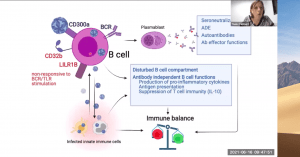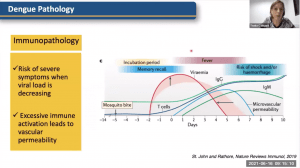 In today’s breaking news article, we highlight Global ImmunoTalks webinar featuring Dr Tineke Cantaert (Institut Pasteur du Cambodia & HHMI/Wellcome International Research Scholar). She began her talk highlighting the Institut Pasteur network and the main focus of her research lab: Investigation of adaptive immune responses to RNA viruses (Arboviruses: Dengue, Chikungunya Virus; Rabies virus) with a specific focus on single cells analysis platform. She then gave an overview of immune responses to Dengue virus.
In today’s breaking news article, we highlight Global ImmunoTalks webinar featuring Dr Tineke Cantaert (Institut Pasteur du Cambodia & HHMI/Wellcome International Research Scholar). She began her talk highlighting the Institut Pasteur network and the main focus of her research lab: Investigation of adaptive immune responses to RNA viruses (Arboviruses: Dengue, Chikungunya Virus; Rabies virus) with a specific focus on single cells analysis platform. She then gave an overview of immune responses to Dengue virus.
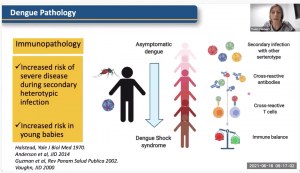 Dengue virus (DENV), transmitted by Aedes aegypti/Albopictus mosquito, is the most widespread of Arboviruses infection with no treatment and only one licenced partially effective vaccine (Dengvaxia ®). There is a wide spectrum of diseases ranging from asymptomatic dengue infection to dengue shock syndrome. She also gave an overview of immune responses associated with DENV disease, highlighting that Dengue is characterised as an immunopathology because severe symptoms (e.g. risk of shock and haemorrhage) occur when viral load is low/undetected.
Dengue virus (DENV), transmitted by Aedes aegypti/Albopictus mosquito, is the most widespread of Arboviruses infection with no treatment and only one licenced partially effective vaccine (Dengvaxia ®). There is a wide spectrum of diseases ranging from asymptomatic dengue infection to dengue shock syndrome. She also gave an overview of immune responses associated with DENV disease, highlighting that Dengue is characterised as an immunopathology because severe symptoms (e.g. risk of shock and haemorrhage) occur when viral load is low/undetected.
Additionally, there are four DENV serotypes known and studies have shown that severe infection is commonly associated with a second DENV infection by a different DENV serotype. This complication has been attributed to o antibody (Ab)-dependent enhancement (ADE) or T cell original sin, where cross-reactive low affinity anti or inappropriate T cell responses contribute to disease pathogenesis.
Highlights of her talk include:
- Similar inflammation and innate immune signatures, viral responses and stress-related responses in asymptomatic and hospitalised dengue
- However, higher T cell activation and Th1 cytokine levels but lower levels of gene expression of genes associated with plasma B cell development and lower frequencies of plasmablasts and plasma cells in asymptomatic compared with hospitalised dengue.
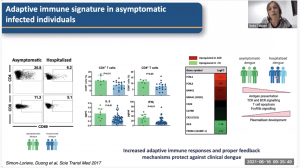
- Severe disease is associated with an increase in IgG binding to DENV infected cells and ADE, as well as increased IgG1 afucoscylation
- IgG1 afucoscylation can be used as a prognostic marker at hospital admissions, and IgG1 afucoscylation is more pronounced in individuals with secondary compared with primary DENV infection.
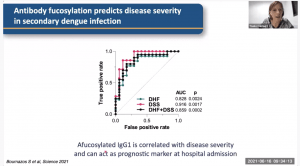
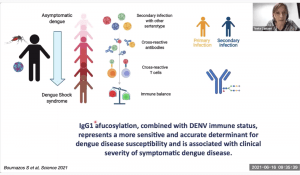
- The image below summarises the main themes discussed:
Summary by Cheleka AM Mpande






